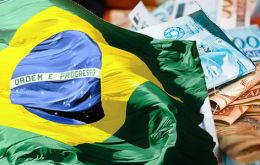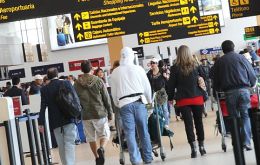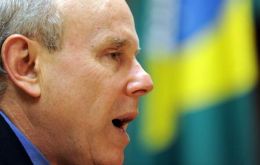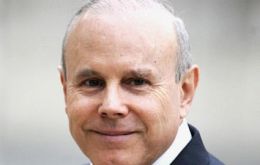MercoPress. South Atlantic News Agency
Tag: Brazil economy
-
Wednesday, April 2nd 2014 - 07:56 UTC
Brazil closes first quarter with the worst trade balance result since 1994

The Brazilian trade balance posted a 112 million surplus in March with exports totaling 17.628 billion dollars and imports, 17.516 billion. It has been the worst result for March since 2001, when a 276.1 million deficit was recorded while the combined deficit for the first quarter of the year, 6.1bn dollars, is the worst result since records started being kept, in 1994.
-
Saturday, March 29th 2014 - 06:11 UTC
Brazil's 2,3% growth in 2013 came as a surprise, even for Minister Mantega

Brazil's economy expanded 2.3% in 2013, compared with growth of 1% the previous year, the Brazilian Institute of Geography and Statistics, IBGE, said this week. The country's GDP for 2013 was estimated at 4.84 trillion Reais (some 2.05 trillion dollars), the IBGE said.
-
Tuesday, March 25th 2014 - 08:51 UTC
S&P downgrades Brazil’s sovereign debt rating to BBB minus

Standard & Poor's cut Brazil's sovereign debt rating closer to speculative territory in a blow to President Dilma Rousseff administration. Brazil had its long-term debt rating downgraded to BBB minus, the agency's lowest investment-grade rating. S&P changed its outlook to stable from negative, meaning further downgrades are unlikely for now, which will come as a relief for both politicians in Brasilia and financial markets.The move was widely expected but the timing surprised some investors.
-
Thursday, March 13th 2014 - 23:16 UTC
Inflation in Brazil edges up in February to an annualized 5.68%

Inflation edged up in Brazil in February to hit an annualized rate of 5.68%, following a 0.69% monthly rise in February, national statistical office IBGE said Wednesday.
-
Saturday, March 8th 2014 - 06:47 UTC
Brazil's trade deficit soars in February: 6.3bn dollars if first two months of 2014

Brazil recorded its largest February trade deficit ever, deepening a trade gap this year that underscores the lack of competitiveness from local industry. The deficit reached 2.125 billion dollars the trade ministry announced.
-
Saturday, February 15th 2014 - 10:21 UTC
Economic activity down for a second straight month in Brazil

Brazilian economic activity fell for the second straight month in December, declining 1.35% relative to November, the Central Bank said in a report Friday. The Economic Activity Index, IBC-Br, considered a reliable predictor of GDP performance, was up 2.57% for all of 2013.
-
Tuesday, January 28th 2014 - 05:00 UTC
Brazil current account deficit ended 2013 at its widest in twelve years

Brazil's current account ended 2013 at its widest deficit in 12 years amid a weakened foreign trade balance, heavy outgoing service payments, overseas profit remittances and an overall lack of confidence in the country's economic policies.
-
Saturday, January 4th 2014 - 04:38 UTC
Mantega releases crucial data to calm market anxiety about Brazil's accounts

Brazil's Finance Minister Guido Mantega insisted on Friday that the government is keeping spending under control as he sought to calm anxiety about the deterioration of the government's accounts. The minister said the primary budget surplus, (excess of revenue over expenditure before debt payments) would be above the goal of 73 billion Brazilian Reais for 2013 (30.5bn dollars), equivalent to about 1.5% of gross domestic product.
-
Monday, December 16th 2013 - 09:30 UTC
Brazilian economy walking on “two crippled legs” argues Minister Mantega

The Brazilian economy is walking with “two crippled legs” according to Finance Minister Guido Mantega who put the blame on the effects of the international slowdown with different rates of recovery, and the lack of credit to prop consumer spending.
-
Friday, December 13th 2013 - 13:04 UTC
Brazil to lower economy stimulus beginning with subsidized credit lines

Brazil will raise interest rates on some state-subsidized credit lines in 2014 withdrawing part of the stimulus that helped boost investments but also hurt public finances this year. Interest rates on loans for the purchase of capital goods and trucks will climb to 6% per year, from 4%, while a special credit line for exports will climb to 8% from 5.5%.
